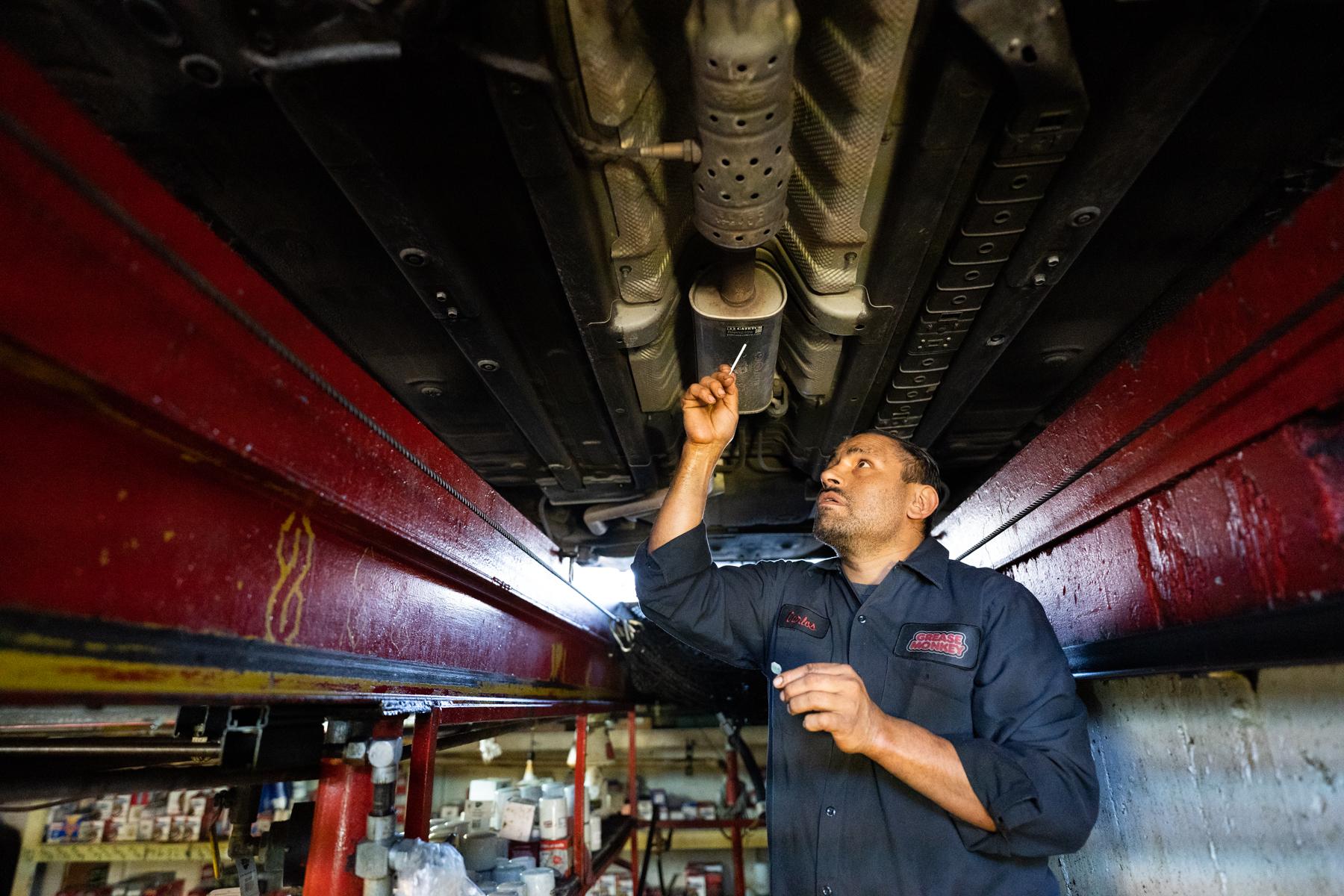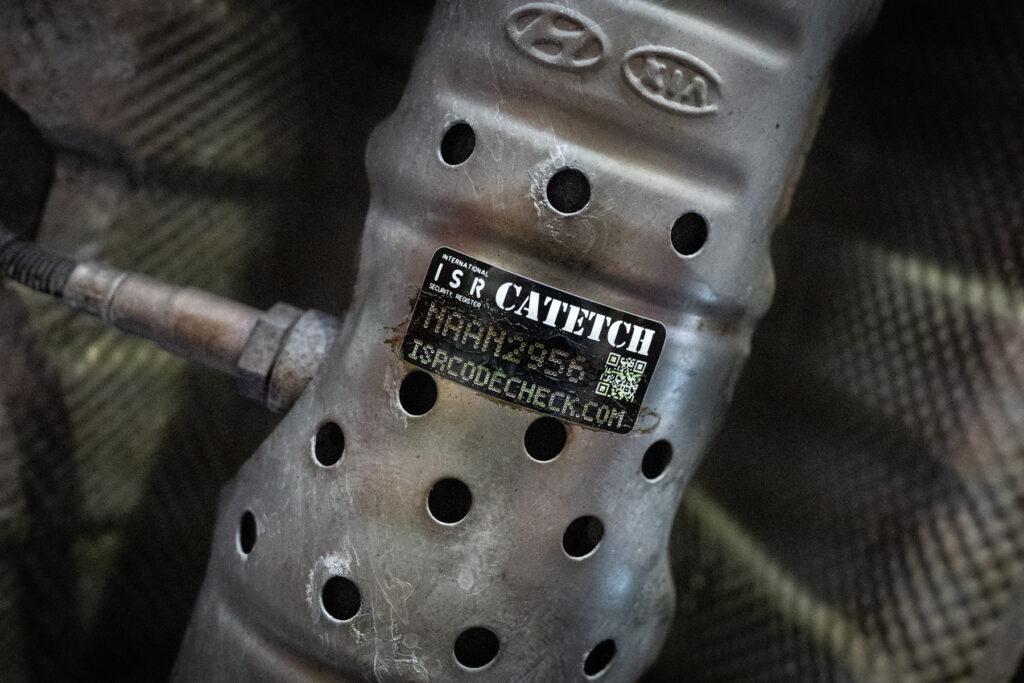
Colorado has a not-so-new defense against catalytic converter thefts: stickers and paintbrushes.
Metro Denver residents can get their hands on a free catalytic converter marking kit at a number of state-run events this month. Colorado legislators upped funding for the kits last year to help cut into thefts of the valuable car part.
Across the country, car owners reported roughly 600,000 converter thefts last year, according to the National Insurance Crime Bureau. Cases in Colorado have hovered in the tens of thousands in recent years, but exact numbers are hard to come by because the crime is underreported, said Cale Gould, public outreach coordinator for the Colorado Auto Theft Prevention Authority.
“All indications we have currently are that theft remains fairly steady and still highly elevated to pre-pandemic rates,” Gould said. “It’s a big problem, along with car theft in general.”
Colorado has given out small numbers of kits in recent years. But 2023 will see a big uptick in giveaways thanks to more funding, Gould said.
The kits are a simple and effective way to reduce the likelihood of a thief sawing off your converter, he said.
It also increases the likelihood of recovering your converter if it is stolen. Replacing a stolen converter can be a big hit to your wallet, costing $1,000-$3,000.
Marking kit giveaways are scheduled for this month at locations in Lakewood and Boulder, as well as Windsor. More locations are expected to open up later this spring. Residents outside of Denver can also request kits directly from the CATPA website.
CPR News picked up one of the kits and tested it out ourselves.
First off, what is a catalytic converter?
Converters are a part of your gas-powered car’s exhaust system. Some cars can have up to four converters. Others only have one.
The part is typically wider than your exhaust pipe. It has different shapes on different makes and models, but it’s typically cylindrical, honeycombed or flat-shaped.
Catalytic converters are usually located underneath your car, close to the outlet of your exhaust pipe.
Using chemical reactions, they convert engine pollutants into carbon dioxide, nitrogen, and water vapor. Without one, your car can spew toxic pollutants into the environment.
Many cars, especially older models, are required by law to have them installed.

Why are thefts so high?
The main reason thefts are high is because the value of precious metals inside of your converter has skyrocketed in recent years. The price for rhodium, one of the main components, is around roughly $8,000 an ounce. That’s up from around $3,000 in 2019.
It’s also relatively easy to steal a converter. Thieves can crawl under your car, saw it off and scram in less than 60 seconds.
Certain cars, such as hybrids, are especially promising targets because those converters carry more of the metals in them. High-profile vehicles are also frequent targets because it’s easier to access their converters.
After stealing your converter, a thief can sell it relatively easily. Most converters do not have unique markings or ways to track them once they are separated from the body of your car.
What is a marking kit and where can I get one?
The marking kit is basically a fancy sticker that you apply directly to the surface of your converter. The idea behind the kits is to have a way to identify it if it does get stolen.
It takes about 10 minutes to complete the kit from start to finish. The kit contains a special adhesive that bakes a physical etching of a unique code onto the surface of your converter. Even if your original sticker comes off, the etching will stay put.
To get one, you have to fill out a short information form with your vehicle’s VIN and personal identification information. Then, you’ll get a small baggie with the materials inside.
Check the state’s website for pickup dates and locations or ways to request a free one by mail if you’re outside of the Denver area.
How do I put it on?
First, locate your converter and make sure it’s cool enough to touch safely. They can get hot.
Clean your converter. Use a wire wheel or a sanding pad to clean it if it’s rusty. Or you can use soap and water if it’s not that bad.
Remove one of the stickers from the baggie and stick it to your converter. Then brush on the adhesive and make sure you’re coating the entire label. That’s it!
All that’s left is to turn on your car and heat up your converter by running the engine. That will activate the etching.
There are videos online of how to do it yourself step-by-step. Many auto repair shops can help you with the process.
How do I register my kit?
After installing your sticker, you need to register your kit online. That way law enforcement officials can look it up if they find it.
The kits being given away by the state are made by an English company called RetainaGroup, which developed the sticker kit after thefts spiked in the United Kingdom.
The company maintains a database of catalytic converter kits, and customers or law enforcement agencies can use it to search for information about a stolen converter.
What happens if it does get stolen?
Marked converters are less likely to get stolen, according to law enforcement officials. They typically act as a deterrent.
If your converter does get stolen, you can contact police and report it. If law enforcement recover your converter, then they can look up your information via the ID number from the marking kit and get in touch with you to return it.
“It gives the investigative tool to law enforcement to be able to inquire into that call converter, instantly be able to look up a status, whether that is stolen, registered, not stolen,” said Cale Gould.
“It’s really that closed-loop tool of locating stolen articles and being able to positively identify that as a stolen catalytic converter,” he said.
Colorado is piloting a reimbursement program for residents who have had their converters stolen, but funding is limited and the application window is currently closed. You can check online periodically for updates, Gould said.
What are other ways I can protect myself from vehicle theft?
On top of converter theft, general car theft remains a big issue in Colorado. About 40,000 vehicles were stolen in 2021, according to state data. Law enforcement officials expect numbers to keep rising.
There are a few common sense tips from experts: Never leave your car running while it’s unattended. Don’t keep a set of spare keys in your car. Park in well-lit areas and keep your valuables hidden from view.
State lawmakers are working to increase penalties for car thefts, which they hope will help prevent more thefts.









